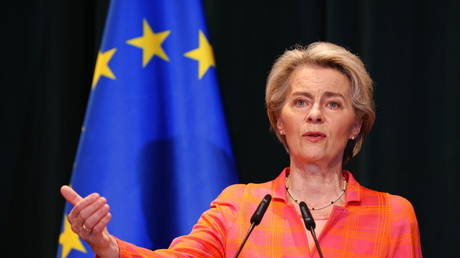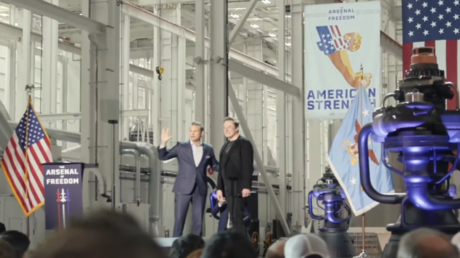
There’s a big difference between actual disinformation or misinformation, and information or analysis that you just don’t like
Apparently, it wasn’t enough for the European Union to block access to media outlets on TV and radio, and demand that YouTube and all social media restrict access to them across Europe. Now, with a ninth round of sanctions, they’ve frozen the assets and funds of various media outlets, including RT’s parent company ANO TV-Novosti.
“Through its subordinate media outlets, including RT, it spread pro-Kremlin propaganda and disinformation, and supported Russia’s war of aggression against Ukraine,” according to the new sanctions announcement.
And here I thought that some of us were just relentlessly mocking the ineptitude and mismanagement of the European Union, joking about how “democratic” the EU likes to think it is even as it sends out European Commission President, “queen” Ursula von der Leyen to tell the plebeians who never voted for her how they have to stick it to Russian President Vladimir Putin by shivering and starving all winter, and just generally trying to help the public understand the discreet interests behind some of the moves being made by Western countries which would otherwise be incomprehensible to the average rationally thinking person. It’s the kind of thing that many of us have been doing across a whole range of highly prominent Western media outlets our entire careers.
But the EU sees it differently when the outlet that gives those voices a platform happens to be Russian, alleging without any specific details or qualification that the media outlet “supported, materially or financially, actions which undermine or threaten the territorial integrity, sovereignty and independence of Ukraine.” By covering and commenting on the news? Really? Or is it just that anything that challenges the official narrative coming out of the EU — and could potentially lead to Europeans focusing the blame for their own suffering on their own elected officials and supranational overlords — has to be censored? That may work for a while, but not forever. As former British Prime Minister Winston Churchill once said, “The truth is incontrovertible. Malice may attack it, ignorance may deride it, but in the end, there it is.”
Evoking security — Ukraine’s, Europe’s, or otherwise — to justify clawing back fundamental rights isn’t new to anyone who has been stuck in lockdown at home during the Covid crisis or who recalls the electronic dragnet that NSA whistleblower Edward Snowden revealed amid the global war on terrorism. But violating the EU’s own tenets of a free press with blanket censorship under the guise of national security is perhaps the most grotesque application of the principle — and violation of what they routinely claim to be their own.
There’s a big difference between actual disinformation or misinformation on the one hand, and information or analysis that you just don’t like on the other. If a journalist or media outlet releases something that’s factually incorrect, then indeed there’s an ethical and regulatory obligation to identify and correct it. That’s what national media regulators in countries all across Europe are for. They have long been watching Russian media platforms like hawks for any such violations, and it’s hard to imagine that they’d be shy in pointing any out.
Journalists have to show their work, so why doesn’t the EU when it censors them en masse with a pen stroke? What the EU has done with its sanctions is nothing short of totalitarian in that a supranational entity has usurped a specific regulatory role defined by national governments across an entire bloc of supposedly sovereign states, and in doing so, has made itself the ultimate arbiter of what citizens are allowed to see and hear. They have become what they criticize when they denounce communist style censorship. When a person without a VPN literally has to exit European Union territory to access news that is freely available to people in Vietnam or Brazil — that’s an information iron curtain, and it’s Made in Europe.
What’s even more troubling is the cheerleading by some members of the media establishment who just don’t like Russia, and use that fact to marginalize or attempt to censor the work of their colleagues on Russian media platforms. Journalists who champion the blanket censorship of information or analysis on the basis that it doesn’t come from a source they like, or one that’s approved or tolerated by their own government, effectively hinder the search for truth by stifling debate and information diversity. Oh, but when Elon Musk — the new billionaire CEO of Twitter, a private social media platform — briefly deactivated the accounts of a handful of Western establishment journalists recently, including from the New York Times and CNN, various western journalists reacted like he had just committed a massacre.
Even more ironically, the EU flipped out over Musk’s hours-long censorship of journalists on a private platform that he personally owns. European Commission Vice-President for “values and transparency”, Vera Jourova, Tweeted: “News about arbitrary suspension of journalists on Twitter is worrying. EU’s Digital Services Act requires respect of media freedom and fundamental rights. This is reinforced under our #MediaFreedomAct. @elonmusk should be aware of that. There are red lines. And sanctions, soon.” Where has Vice-President Values been amid the repeated sanctioning of journalists by the EU since February?
If the EU held itself to the same standard of respect for media freedom that it demands of Musk, then it would have already sanctioned itself. Which, actually, is something that the EU has become really good at doing as the impact of its own anti-Russian sanctions blows back onto its own people. Good luck censoring that.




